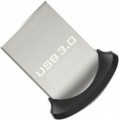Memory size
Total storage capacity. The larger it is, the more information can be simultaneously written to a USB flash drive. For comparison: the size of text documents rarely exceeds 1 MB, audio files and photos usually take several megabytes, short videos — several tens of megabytes, and a DVD-quality movie has a volume ranging from one and a half gigabytes and more. On the other hand, the price of the drive directly depends on this indicator. Thus, many manufacturers have flash drives similar in basic characteristics, differing only in volume — this makes it easier to choose the option that is optimal in terms of price and capacity.
Now on the market there are flash drives with the following volume:
4 GB,
8 GB,
16 GB,
32 GB,
64 GB,
128 GB,
256 GB,
512 GB and more.
Material
—
Plastic. Inexpensive and at the same time quite practical material. Plastic allows you to create cases of almost any shape and colour — from classic to very original; yet it is strong and reliable enough to protect the flash drive during normal household use and even in some adverse situations. At the same time, the strength and impact resistance of plastic are relatively low, and in case of serious "troubles" — falling from a great height, stepping on a flash drive, etc. — such a case with a high degree of probability will be damaged. However, such situations rarely occur, and there are quite a few varieties of plastic, some of them are very durable. Therefore, this material in modern flash drives is extremely popular.
—
Metal. Metal combines high strength and reliability with a stylish appearance; flash drives made of this material look solid and are able to withstand fairly strong impacts that would damage a plastic product. Such cases can be heavier than plastic, but this cannot be called a disadvantage: the weight of modern flash drives is not so large that it creates inconvenience, and the massiveness of the product enhances the impression of solidity. But of the unequivocal disadvantages of metal, one can name a higher cost than plastic.
—
Rubber. Rubber is quite easy to work with and is suitable for creating complex shaped cases; many flash driv
...es made from this material are of the original design. The main practical feature of rubber is elasticity. This makes the case quite shock-resistant and allows you to endure strong short-term pressure without consequences (for example, if you step on the product). At the same time, rubber is somewhat more expensive than plastic, and the advantages mentioned in most cases are not of key importance. Therefore, this material is much less common.
— Skin. Leather by itself is not suitable as a body material; therefore, in this case, we are usually talking about a leather covering on a solid base — metal or plastic. See above for more details on these materials; as for the skin, this material gives the flash drive a rich and solid appearance, but it is not cheap, and from a practical point of view it does not provide any special advantages. Therefore, cases with leather inserts are the prerogative of fashion models, for which not only functionality is important, but also an expensive representative design.
— Wood. From a practical point of view, wood has no advantages over plastic, while it is noticeably more expensive and more difficult to manufacture — in particular, because special processing is required for moisture resistance and strength. The advantage of this material can be called an attractive appearance; in addition, some users consider wooden cases to be the most "green" or pleasant to the touch. As a result, such cases are rare — only in designer models of "flash drives", created in order to stand out among plastic and metal products.Manufacturer's warranty
Manufacturer's warranty provided for this model.
In fact, this is the minimum service life promised by the manufacturer, subject to the rules of operation. Most often, the actual service life of the device is much longer than the guaranteed one. But an indicator of
5 years suggests that the flash drive is more likely to be lost or become irrelevant. You can also come across
a lifetime warranty, however, in this case it is better to drown out the details to which it applies. And anyway, it implies a certain period of time, though measured in decades. In addition to confirmation of reliability, such a guarantee allows you to contact the supplier after a while to eliminate possible problems (of course, not mechanical). But the difficulties in implementing this procedure (the representative office is located only in large cities) and the rare cases of the need for this (after all, it is easier to buy a new flash drive, with the exception of vital information on the old media) make the lifetime warranty more of a marketing ploy than a cool chip.

